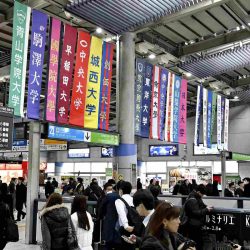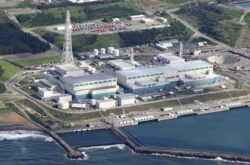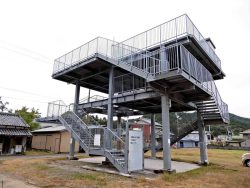U.S. Startups Can Help Support Japanese AI Applications; Synthetic Data One Way to Boost Learning by AI

Mike Kim
12:03 JST, March 26, 2025
My guest and I raised our first beers with a “kampai” toast at Andy’s Shin Hinomoto in November 2024. With its unique mix of Japanese people and foreigners, the popular izakaya pub in Tokyo’s bustling Yurakucho district is one of my favorite spots to host clients and friends.
On this occasion, I was hosting an acquaintance from NTT Data, a Tokyo-based IT services provider. I reached out to him to propose a collaboration with U.S. startup Bifrost AI, a client of mine specializing in 3D synthetic data generation for artificial intelligence training. Unlike real-world data, synthetic data is artificially generated, allowing for more scalable and diverse datasets.
As a result of the dinner in Yurakucho, I later got to know Takashi Okada, who develops new businesses at NTT Data’s Innovation Center. Okada and his team then had a meeting with people from Bifrost AI, which cemented the tie between the two companies. A project was kicked off in just three months. This example appeared to illustrate Japanese corporations’ desire to quickly access the technology of specialized AI startups.
NTT Data is realizing digital transformation with AI for its clients. The Innovation Center serves as the company’s central hub for developing AI and other cutting-edge technologies. It engages in pilots and proof-of-concept projects with other companies to validate new ideas before implementation with the company’s customers.
NTT Data was interested in creating robust AI models to detect objects in diverse environments. One of the focal areas is the use of AI on satellite images for use cases such as remote facility maintenance of utilities, asset tracking for shipping companies, smart agriculture and optimization of mining companies’ production processes. However, the company faced many hurdles in sufficiently and correctly collecting real-world data.
AI models require vast amounts of data — sometimes hundreds of thousands of images — to effectively learn to accurately recognize objects. But getting data at this scale is often impractical or even impossible. Datasets also often lack diversity, failing to capture variations in lighting, weather and environments, such as winter versus summer or desert versus tropical settings.
Bifrost AI is a well-qualified partner for NTT Data because its business is aimed at supporting customers who require large, diverse datasets to enhance the performance of their AI systems. The startup generates high-quality synthetic data — realistic, computer-generated images — and helps train AI models more effectively.
This is particularly important for physical AI, where machines need to “see” and interpret the world through cameras and sensors. Just as a child learns to recognize dinosaurs from books and TV, AI can learn to identify new or rare objects by using Bifrost AI’s synthetic images. Synthetic image generation not only removes data limitations but also provides a cost-effective solution for training AI with greater accuracy and reliability.
NTT Data has decided to use Bifrost AI’s synthetic data to enhance its AI models to remotely monitor assets and facilities so that the risk of damage from disasters could be reduced, for instance. The technology could also minimize the human effort of going to check real facilities which could be in the middle of tropical forests.
“What convinced us to move forward with Bifrost AI was their unique capability of realizing real-world ‘digital twins’ for synthetic data generation. With this, their platform allows us to test our AI with various rare situations,” said Okada.
The relationship between the two companies has been progressing quickly. At a conference hosted by NTT Data in Milan on Mar. 26-27, Bifrost AI will demonstrate their synthetic data generation capabilities.
Exciting collaborations between Japanese corporations and specialized AI startups are developing in important fields including maritime domain awareness for national security, supply chain management for manufacturing, readiness for natural disasters and the transition to decarbonization.
As Japan’s corporations continue to collaborate with specialized U.S. AI startups, these partnerships are expected to accelerate innovation and help attain AI-led economic growth in the country.
Mike Kim is the founder of Gradient Consulting, a consultancy specializing in accelerating the Japan and Asia business of AI technology companies and startups. He has over 20 years of experience across nine countries in the Asia Pacific region and is based in Tokyo.
"Editorial & Columns" POPULAR ARTICLE
-

Violations of Subcontract Law: Major Automakers Must Eliminate Old Practices
-

Local Governments’ Tax Revenues: Devise Ways to Correct Imbalances in Tax Sources
-

5 Japanese Business Dinner Mistakes to Avoid — and What They Taught Me About Business in Japan
-

Heavy Rains in Asia: Support for Victims, Flood-Control Measures Urgently Needed
-

Rice Coupons: A Misguided Approach to Countering Rising Prices
JN ACCESS RANKING
-

Tokyo Economic Security Forum to Hold Inaugural Meeting Amid Tense Global Environment
-

Keidanren Chairman Yoshinobu Tsutsui Visits Kashiwazaki-Kariwa Nuclear Power Plant; Inspects New Emergency Safety System
-

Imports of Rare Earths from China Facing Delays, May Be Caused by Deterioration of Japan-China Relations
-

University of Tokyo Professor Discusses Japanese Economic Security in Interview Ahead of Forum
-

Japan Pulls out of Vietnam Nuclear Project, Complicating Hanoi’s Power Plans

























